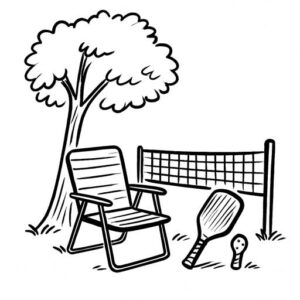
The Birthplace of Pickleball: Bainbridge Island’s Backyard Legacy
Pickleball, a paddle sport combining elements of tennis, badminton, and table tennis, originated on Bainbridge Island, Washington, in 1965. This small island, located a short ferry ride from Seattle, is celebrated as the birthplace of a sport that has grown into a global phenomenon. The game was invented in a residential backyard, and its legacy continues to shape the island’s cultural and recreational identity.
Origins of Pickleball
In the summer of 1965, Joel Pritchard, a U.S. congressman and later Washington lieutenant governor, along with friends Bill Bell and Barney McCallum, sought to entertain their bored families at Pritchard’s vacation home on Bainbridge Island. Unable to find a complete set of badminton equipment, they improvised with ping-pong paddles, a perforated plastic ball (similar to a Wiffle ball), and a badminton court. The net was lowered to 36 inches, and the trio devised simple rules to create a fun, accessible game for all ages. This impromptu creation marked the birth of pickleball.
The name “pickleball” is attributed to Joan Pritchard, Joel’s wife, who likened the game to a “pickle boat” in crew racing, where leftover rowers form a mixed team. A competing story suggests the game was named after the Pritchard family dog, Pickles, who chased stray balls. However, the Pritchards maintained that the dog was acquired after the game’s naming, and historical records support the pickle boat origin as more likely.
Early Development and Spread
The game quickly gained traction among Bainbridge Island residents. Neighbors and friends joined in, and by 1967, the first permanent pickleball court was constructed in the backyard of Bob O’Brian, a friend and neighbor of the Pritchards. The sport’s accessibility, played on a compact 44-by-20-foot court, made it ideal for residential settings. Many islanders added pickleball courts to their properties, fostering a community-driven spread.
In 1972, Pritchard, McCallum, and others formed Pickle-Ball, Inc. to manufacture equipment and promote the sport. The company trademarked the name and sold wooden paddles and starter kits. By the mid-1970s, pickleball gained national attention through articles in The National Observer (1975) and Tennis magazine (1976), which dubbed it “America’s newest racquet sport.” The first known tournament was held in Tukwila, Washington, in 1976, and in 1984, the USA Pickleball Association (USAPA) was established to standardize rules and advance the sport.
Bainbridge Island’s Role as Pickleball’s Epicenter
Bainbridge Island remains a pilgrimage site for pickleball enthusiasts. The original court, located on private property once owned by the Pritchard family, is preserved in its 1965 condition, with cracked asphalt and tree roots adding to its historical charm. Though not publicly accessible, it is recognized by the Bainbridge Island Historical Museum for its cultural significance. The museum houses artifacts such as early paddles, rulebooks, and photographs documenting the sport’s origins.
The island’s commitment to pickleball is evident in its public facilities. The Founders Courts at Battle Point Park, completed in 2020, feature six dedicated pickleball courts honoring Pritchard, Bell, and McCallum. Managed by the Bainbridge Island Pickleball Club and the Bainbridge Island Parks Department, these courts host local games and attract visitors. The annual Founders Tournament, initiated in 2019 by the Bainbridge Island Historical Museum, draws players nationwide and serves as a fundraiser for the museum.
Cultural and Historical Significance
Pickleball’s roots on Bainbridge Island reflect its community-oriented ethos. The sport’s design emphasizes inclusivity, appealing to players of all ages and skill levels. This accessibility has fueled its growth, with millions of players worldwide and recognition as Washington’s official state sport in 2022, formalized by Governor Jay Inslee at the original court. The island’s residents take pride in their role as stewards of pickleball’s heritage, maintaining a welcoming environment for players and visitors.
The sport’s legacy is also preserved through storytelling and education. The Bainbridge Island Historical Museum offers exhibits and oral histories, including recordings of Barney McCallum recounting the game’s early days. Commemorative plaques at the Founders Courts detail the contributions of Pritchard, Bell, and McCallum, ensuring their innovation is remembered.
Pickleball’s Global Impact and Bainbridge’s Lasting Legacy
From its humble beginnings, pickleball has evolved into a professional sport with international federations, professional tours, and thousands of courts worldwide. Innovations in equipment, such as composite paddles introduced in 1984, have enhanced gameplay, but the sport retains its backyard spirit. Bainbridge Island continues to inspire players and communities, serving as a reminder of how a simple idea can unite people through sport.
The island’s pickleball culture thrives through local clubs, public courts, and events like the Founders Tournament. Specialty shops, such as Island Life Artisan Gifts, offer pickleball-themed merchandise, catering to visitors seeking mementos of the sport’s birthplace. As pickleball grows, Bainbridge Island remains its spiritual home, embodying the creativity and community that sparked a global phenomenon.